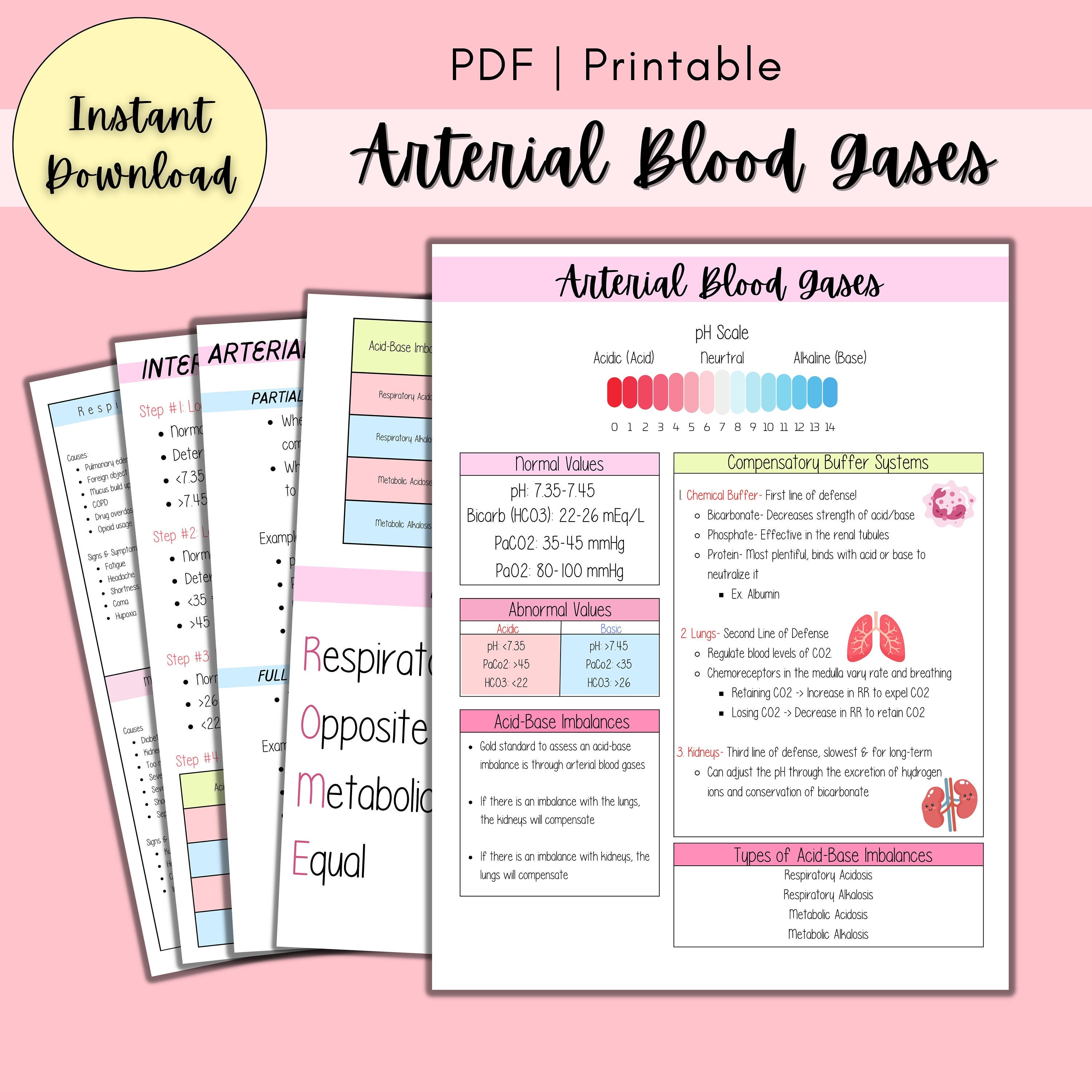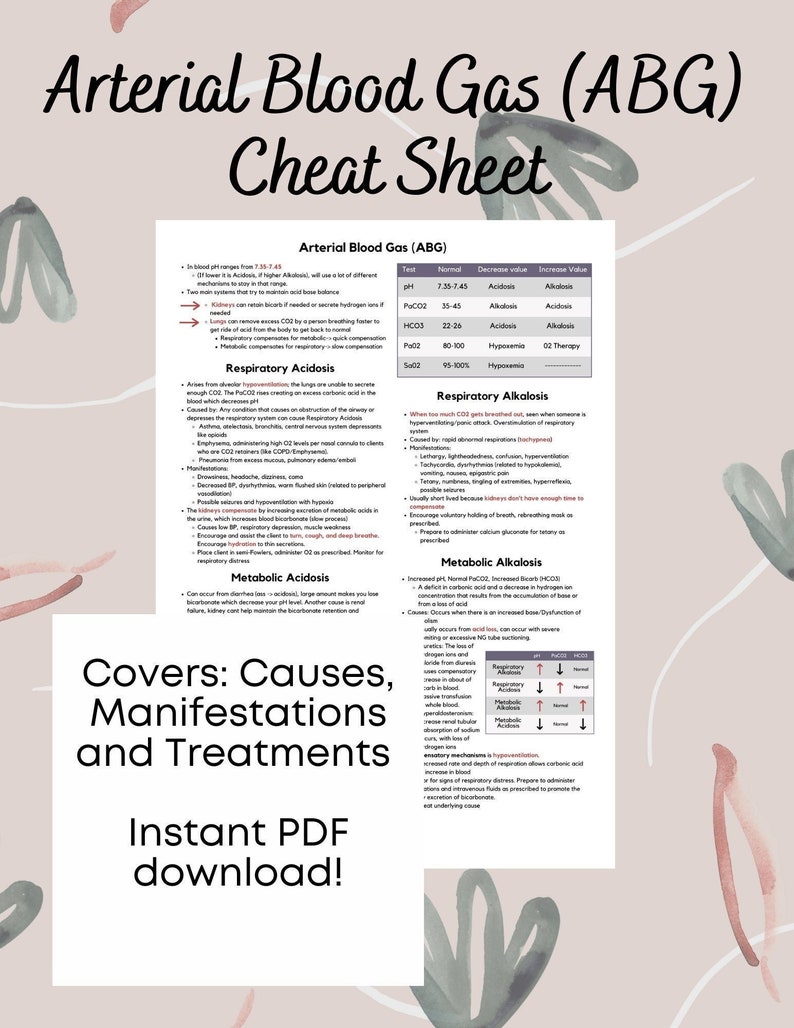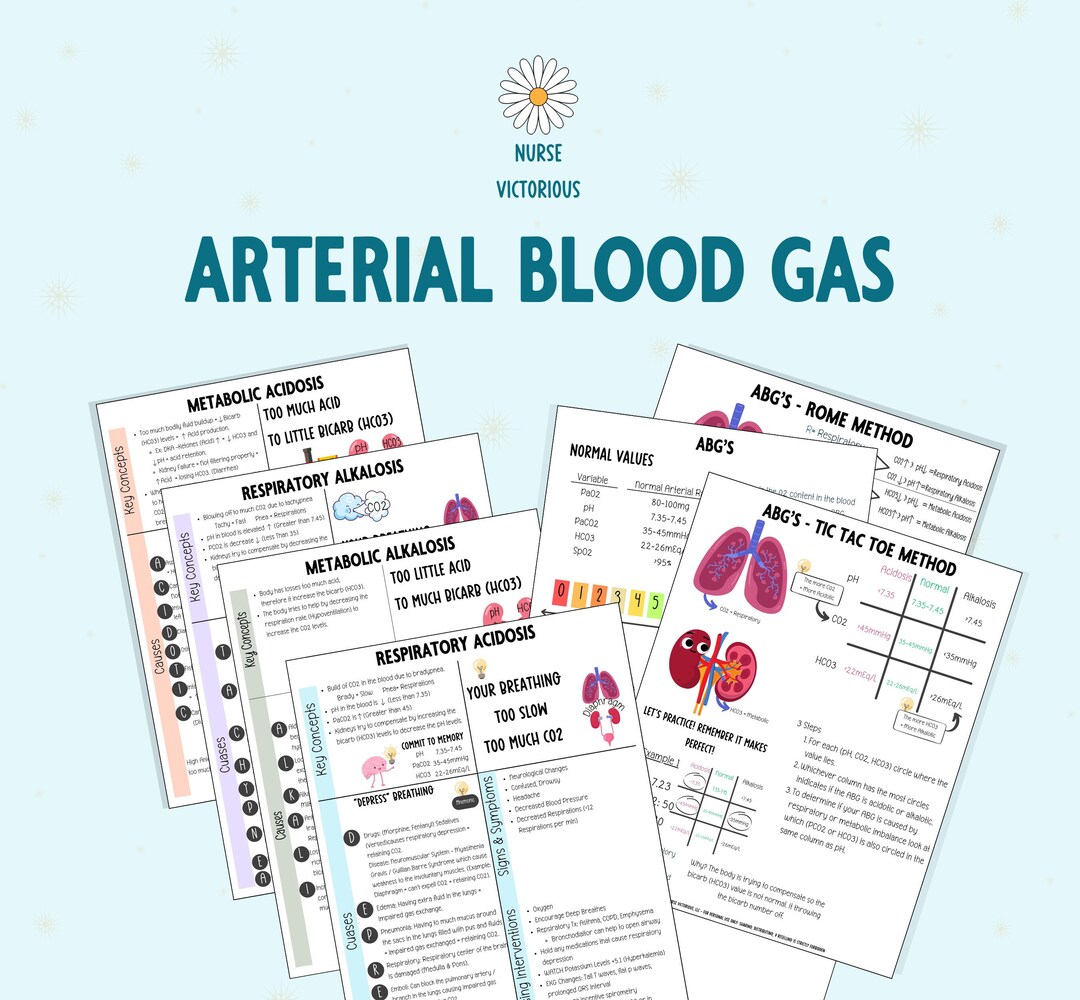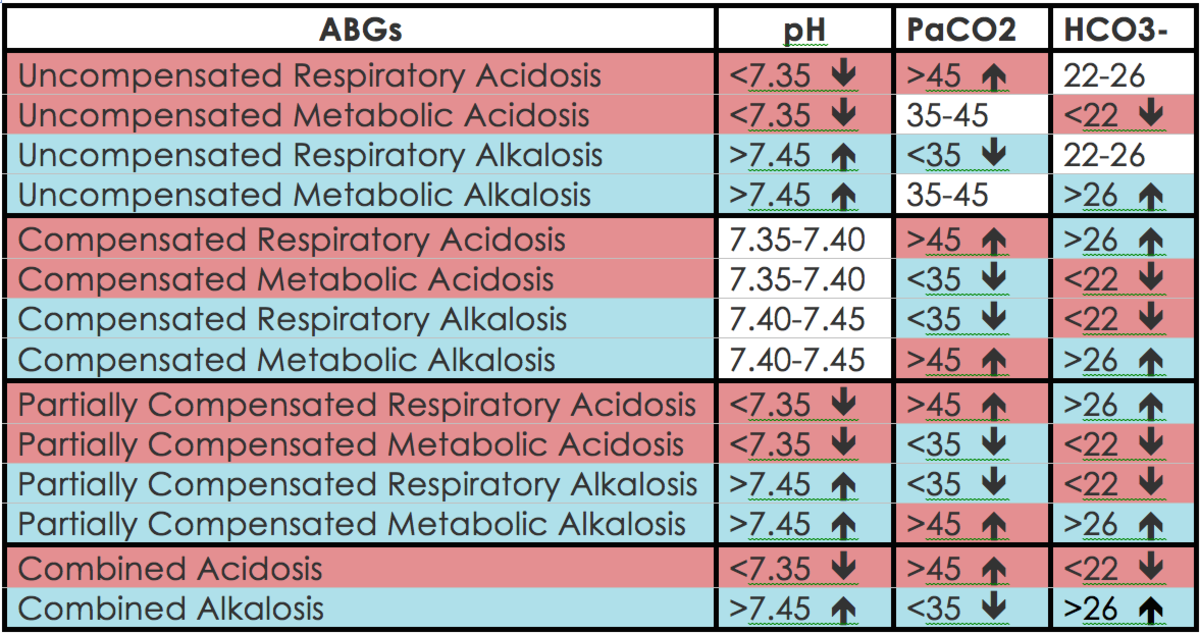Arterial Blood Gas Cheat Sheet - So in this cheat sheet, i’ll walk you through how to interpret arterial blood gas panels (abg panels) quickly and easily! Interpretation of arterial blood gases (abgs) is a crucial skill that a lot of student nurses and medical practitioners need to learn. Interpreting an arterial blood gas (abg) is a crucial skill for physicians, nurses, respiratory therapists, and other health care personnel.
So in this cheat sheet, i’ll walk you through how to interpret arterial blood gas panels (abg panels) quickly and easily! Interpretation of arterial blood gases (abgs) is a crucial skill that a lot of student nurses and medical practitioners need to learn. Interpreting an arterial blood gas (abg) is a crucial skill for physicians, nurses, respiratory therapists, and other health care personnel.
Interpreting an arterial blood gas (abg) is a crucial skill for physicians, nurses, respiratory therapists, and other health care personnel. Interpretation of arterial blood gases (abgs) is a crucial skill that a lot of student nurses and medical practitioners need to learn. So in this cheat sheet, i’ll walk you through how to interpret arterial blood gas panels (abg panels) quickly and easily!
Arterial Blood Gases, Abgs, NCLEX, Nursing Notes, Nursing Fundamentals
Interpreting an arterial blood gas (abg) is a crucial skill for physicians, nurses, respiratory therapists, and other health care personnel. Interpretation of arterial blood gases (abgs) is a crucial skill that a lot of student nurses and medical practitioners need to learn. So in this cheat sheet, i’ll walk you through how to interpret arterial blood gas panels (abg panels).
Arterial Blood Gas ABG Cheat Sheet Etsy New Zealand
Interpreting an arterial blood gas (abg) is a crucial skill for physicians, nurses, respiratory therapists, and other health care personnel. So in this cheat sheet, i’ll walk you through how to interpret arterial blood gas panels (abg panels) quickly and easily! Interpretation of arterial blood gases (abgs) is a crucial skill that a lot of student nurses and medical practitioners.
ABG / Arterial Blood Gases Cheat Sheet Etsy
So in this cheat sheet, i’ll walk you through how to interpret arterial blood gas panels (abg panels) quickly and easily! Interpreting an arterial blood gas (abg) is a crucial skill for physicians, nurses, respiratory therapists, and other health care personnel. Interpretation of arterial blood gases (abgs) is a crucial skill that a lot of student nurses and medical practitioners.
Arterial Blood Gas Cheat Sheet Abgs Nursing Notes ABG Study Sheet
Interpreting an arterial blood gas (abg) is a crucial skill for physicians, nurses, respiratory therapists, and other health care personnel. Interpretation of arterial blood gases (abgs) is a crucial skill that a lot of student nurses and medical practitioners need to learn. So in this cheat sheet, i’ll walk you through how to interpret arterial blood gas panels (abg panels).
Arterial Blood Gases Cheat Sheet
So in this cheat sheet, i’ll walk you through how to interpret arterial blood gas panels (abg panels) quickly and easily! Interpretation of arterial blood gases (abgs) is a crucial skill that a lot of student nurses and medical practitioners need to learn. Interpreting an arterial blood gas (abg) is a crucial skill for physicians, nurses, respiratory therapists, and other.
Arterial Blood Gases Cheat Sheet
Interpreting an arterial blood gas (abg) is a crucial skill for physicians, nurses, respiratory therapists, and other health care personnel. So in this cheat sheet, i’ll walk you through how to interpret arterial blood gas panels (abg panels) quickly and easily! Interpretation of arterial blood gases (abgs) is a crucial skill that a lot of student nurses and medical practitioners.
Arterial Blood Gases Cheat Sheet
So in this cheat sheet, i’ll walk you through how to interpret arterial blood gas panels (abg panels) quickly and easily! Interpreting an arterial blood gas (abg) is a crucial skill for physicians, nurses, respiratory therapists, and other health care personnel. Interpretation of arterial blood gases (abgs) is a crucial skill that a lot of student nurses and medical practitioners.
Arterial Blood Gases Cheat Sheet
Interpreting an arterial blood gas (abg) is a crucial skill for physicians, nurses, respiratory therapists, and other health care personnel. So in this cheat sheet, i’ll walk you through how to interpret arterial blood gas panels (abg panels) quickly and easily! Interpretation of arterial blood gases (abgs) is a crucial skill that a lot of student nurses and medical practitioners.
Abg nursing cheat sheet with a step by step study guide on blood gas
Interpreting an arterial blood gas (abg) is a crucial skill for physicians, nurses, respiratory therapists, and other health care personnel. Interpretation of arterial blood gases (abgs) is a crucial skill that a lot of student nurses and medical practitioners need to learn. So in this cheat sheet, i’ll walk you through how to interpret arterial blood gas panels (abg panels).
Quick Interpretation Of Blood Gases
Interpretation of arterial blood gases (abgs) is a crucial skill that a lot of student nurses and medical practitioners need to learn. Interpreting an arterial blood gas (abg) is a crucial skill for physicians, nurses, respiratory therapists, and other health care personnel. So in this cheat sheet, i’ll walk you through how to interpret arterial blood gas panels (abg panels).
So In This Cheat Sheet, I’ll Walk You Through How To Interpret Arterial Blood Gas Panels (Abg Panels) Quickly And Easily!
Interpretation of arterial blood gases (abgs) is a crucial skill that a lot of student nurses and medical practitioners need to learn. Interpreting an arterial blood gas (abg) is a crucial skill for physicians, nurses, respiratory therapists, and other health care personnel.









